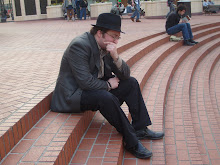On Janurary 30th, I attended the 5th Annual Soul Food Dinner at Portland State University in the Smith Ball Room. The Soul Food Dinner is a celebration of African American history, culture, and accomplishments. Coinciding with African American History Month, the Soul Food Dinner features traditional African American food, prominent African American Oregonians, and African American art. While attendees try traditional food found in black homes around the holidays, artists perform and presenters showcase achievements of African Americans.
When the program began, it was solely put on by the Department of Residence Life. The program was created by Dementro “Debo” Powell, an Area Coordinator in the department, as a way to share the traditional food he grow up with students at Portland State. During the first year, the program had an estimated 100 people attend, and this year it fed, educated, and entertained over 800 individuals.
During its five year history, the Soul Food Dinner has grown into a massive collaborative process. It has grown from only having Residence Life to including multiple other departments from the Division of Student Affairs including PSU Ambassadors, Student Legal & Mediation Services, the Dean of Student Affairs, and more. The program is such a premier event at PSU that even the Attorney General for the state of Oregon helped out. He secured this year’s keynote speaker: Terry Porter.
In addition to the various departments, the Soul Food dinner includes multiple student groups including Black Cultural Affairs, fraternities, Residence Housing Association, and more. In a large university, this level of collaboration is quite stunning because due to scarce resources departments are usually more prone to isolation. It would not be possible without the incredible vision and devotion of Debo. He is emotionally invested in this program, and people are drawn to work with him on this successful endeavor.
Of course, the program involves more than just people at the university. Additionally, Debo works closely with the African American artist, Mo. Mo was the first African American to receive a scholarship in the visual arts at PSU and has remained connected with the school through the Soul Dinner.
Mo’s involvement brings in another level of collaboration on her part. By being actively involved in the Portland African American Arts community, Mo brings in several other artists as well. While she is primarily a visual artist, Mo invites several spoken word performers to exhibit at the Soul Food Dinner. These individuals discuss issues relevant to African American men and women in an attempt to educate all races about the struggles of these people in the United States. The works are powerful, emotional, angry, and occasionally humorous as demonstrated by Good Sista/Bad Sista.
In addition to the professional artists, the Soul Food Dinner showcases student performers. One of the African American fraternities demonstrated stepping. While a university dance group performed a piece, and there were students singers.
With Debo actively job searching and planning on leaving the Portland area, it will be interesting to see how successful this program will be without. Although he has included so many people in the process, so much of the work and relationships depend simply on his charisma and personality. I sincerely hope this program continues to succeed in the future because it always an incredibly powerful event.
